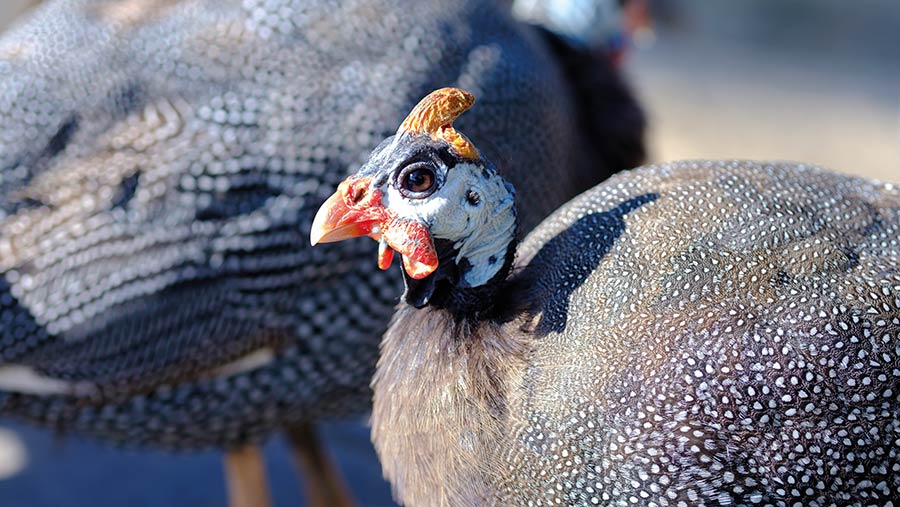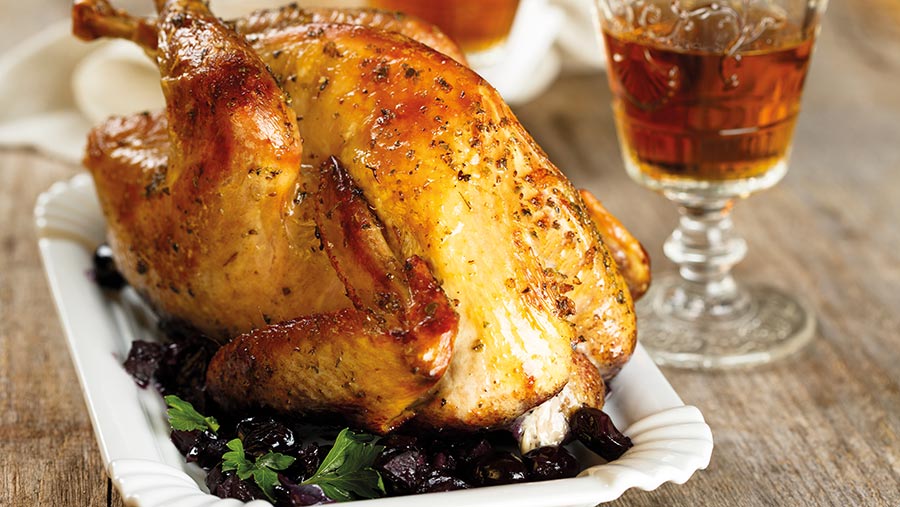Quail and guineafowl: What’s the market for UK farmers?
 © Adobe Stock
© Adobe Stock British-produced speciality meats such as guineafowl and quail are difficult to source. With so few UK farmers running flocks, dealers and retailers have to rely mainly on French imports.
But as consumers look to be more environmentally focused, there could be an untapped niche for British farmers in a sector supplying slower-growing birds with low food miles – if there was appropriate support from supermarkets and the government.
We ask growers and retailers for their insights on the opportunities for guineafowl, and discover why, for one quail producer, market volatility means the business is no longer viable.
See also: Commercial-scale guinea fowl find their niche
Producer’s view
Producing free-range Suffolk guineafowl is something of a sideline for Chris Mobbs, helping to support sales from his more substantial free-range Christmas turkey business. But farming guineafowl at all is quite a rarity in the UK.
“For three generations, the Mobbs family have been rearing Christmas turkeys in a traditional manner,” says Mr Mobbs, trading as PA Mobbs & Sons, based near Cratfield.
“We started with guineafowl about 10 years ago. We were looking for another product, as well as turkeys. We don’t produce them on a large scale, but they are good for our business promotionally.
“We go to the Aldeburgh Food & Drink Festival, where guineafowl attract attention and, once people are on the stand, we sell turkeys off the back of it.
“We’re just too far off the beaten track to sell to London restaurants – if you take transport costs into consideration it is very difficult to make it pay.”
Mr Mobbs sells to local butchers and farm shops as well as offering a delivery service to customers. He rears 4,000 turkeys and 400 guineafowl a year, mainly for the Christmas trade, although birds can also be ordered at other times of the year.
Customers appreciate the fact that the birds are reared under free-range conditions, he says.
“Free-range means our birds have grassy paddocks to run in, with enough space to really spread their wings. At night they sleep in a warm, dry shed to protect them from foxes.”
Birds are also fed on home-grown grains and pulses, he says.
“Most poultry farmers buy their feed from a large commercial mill, but we still believe that the grains we grow on the farm are best for our birds. We grow wheat, barley, oats, beans and peas and mill them ourselves.”
At tasting events, people love the flavour of guineafowl and often say it tastes “like chicken used to”, says Mr Moyles.
“We encourage customers to try it roasted or in their favourite casserole dish, and have posted some of our favourite recipes on our internet recipe page, pamobbs.co.uk.”
Guineafowl can be roasted in the same way as a chicken, with a 2kg fowl taking about one hour 20 minutes at 180C.
“Our guineafowl are very different from the intensively reared French birds often sold in supermarkets,” says Mr Mobbs.
“Our English guineafowl are reared slowly to reach maturity. They are larger than imported birds, so one Suffolk guineafowl will feed four people.”
A medium-sized bird (1.5-1.8kg) costs £18, and a large one (1.9-2.4kg) costs £20 – plus postage and packing for online orders.
Retailer’s view
One company selling guineafowl via its website is The Wild Meat Company, co-founded by Robert Gooch.
“We have been selling it since we started The Wild Meat Company 22 years ago.
“We process game and speciality poultry, but couldn’t find any UK-based commercial operators who could produce large quantities of guineafowl,” says Mr Gooch.
There is not a huge demand for guineafowl, which could account for the lack of interest in commercial production, he says.
“They have a slightly higher value than chicken. With the cost-of-living crisis, some customers are downsizing to cheaper cuts and we may not see an increase in demand until the crisis ends.”
Consumers tend to buy guineafowl based on a perception that it is farmed less intensively than chicken.
“We sell free-range and barn-reared guineafowl imported from France. Customers have a choice and, as with chicken, free-range is more expensive.
“We import about a pallet a month and sell it in various cuts – fillets, supremes and whole birds. If it is less intensively reared, customers are willing to pay a little more for it,” adds Mr Gooch.
“As far as I know British guineafowl isn’t available on a commercial scale. When we tried to stock it, we couldn’t find anyone who produced it.
“If you farm it and have no buyer, you could lose a lot of money, so you need an outlet before you sell it. It must also be killed at an abattoir certified for guineafowl.”
The Wild Meat Company sells free-range guineafowl for £13.95 a bird and barn-reared for £9.95.
The meat is more widely eaten in France, says Mr Gooch. “France has a big food culture, unlike the UK where McDonald’s, fish and chips and Kentucky Fried Chicken are popular.”
Farm shop’s view
Kimbers Farm Shop, near Wincanton, Somerset, imports guineafowl from France via its game dealer. But the owners would like to source British-produced birds, if they could find them, says partner Naomi Kimber.
“We are always looking to buy locally for sustainability reasons and have tried Google searches, but we can’t source British guineafowl.”
She believes French consumers have more of a link to farming than those in the UK.
“The way [the French] inheritance system works means more city dwellers have a bigger connection to the countryside and knowledge about different types of meat.”
The farm shop sells about 20 or 30 guineafowl a month round the UK, says Ms Kimber. “We tend to sell most in the game season. We also sell a lot at Christmas.”
Business in the farm shop in general has increased by 50% since Covid, which has driven sales of guineafowl, she adds. “More people are looking at guineafowl on the website and trying it.”

© Adobe Stock
Former producer’s view
After 10 years of hard work to try to put British quail on the map, Norfolk Quail stopped producing quail meat last October due to market volatility caused by the Covid-19 pandemic.
“It was a decision that was extremely hard to take, but, in hindsight, thank goodness we stopped.
“With the high increase in cost of production, including rising overheads, the price would have to be so high that customers wouldn’t have paid it,” says director Ellie Savory.
Unreliability of couriers played a big part in the decision to cease production, says Ms Savory.
“There’s no compensation on perishable produce in any courier service, so when they failed to deliver on time and the produce was spoiled, it was us, the supplier, who had to replace it.
“The service was tricky before Covid, but as the shortage of drivers became such a problem, we found ourselves without a reliable delivery mechanism.
“And with only one product it was unviable to set up our own national network.”
The pandemic-fuelled failure of restaurants supplied by Norfolk Quail and others wanting payment terms of 60-90 days contributed to the decision to cease production, says Ms Savory.
“We have taken a break and feel that unless we find a suitable distributor to undertake all marketing and distribution, we are unlikely to resume production.”
The UK farming industry is very different to that in Europe, where farmers are more supported by governments and populations who value home-grown produce, she adds.
“Our supermarkets insist on high profit margins, endlessly cutting the prices they pay to suppliers and producers, which makes it unviable for farmers.
“In the egg and pig industries many farmers are going out of business or operating at huge losses.
“Perhaps if supermarkets reduced their profit margins by as little as 5%, producers could be paid that little bit more just to stay in business.
“There is an impending food crisis and it seems to us as farmers that little is being done by government to step in and stop it from happening.
“Food security in the UK should be a priority, but unfortunately it seems that profits for supermarkets and their stakeholders are all that matters,” says Ms Savory.
